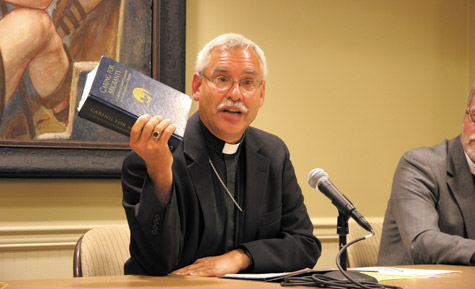
CHARLOTTE, N.C. -- Christians, especially political leaders of both parties, have a moral duty to address the plight of undocumented immigrants in America as part of the Gospel message to bring justice to the poor, welcome the marginalized, and stand up for the powerless.
That was the main point made during a Sept. 4 screening of “Gospel Without Borders,” an award-winning 2011 documentary featuring Bishop Anthony B. Taylor that tells the story of illegal immigrants in states including Arkansas and North Carolina, shown last week in Charlotte, N.C., to coincide with the Democratic National Convention. It depicts how Catholics, Baptists, Methodists and Presbyterians address immigration from a faith-based perspective, without delving into the partisan divide on the issue. It was produced by EthicsDaily.com, a division of the Baptist Center for Ethics in Nashville, Tenn., and funded by a grant from the United Methodist Foundation of Arkansas.
More than 90 Democratic delegates, religious leaders and others attended the event at St. Peter Church, which included a screening of the film and a discussion by religious leaders featured in the documentary including Bishop Taylor.
Bishop Taylor has worked more than 25 years in Hispanic ministry and wrote a 2008 pastoral letter on the human rights of immigrants.
The non-partisan event at St. Peter Church was about “a moral witness of faith leaders to political leaders about the urgency of addressing immigration reform. Nothing more. Nothing less,” said Robert Parham, executive director of the Baptist Center for Ethics and co-producer of the documentary, in a recent editorial.
“We want this to be a moral challenge to the Obama Administration and to Democratic officials,” Parham said, to address the estimated 10 million undocumented people living in the U.S. and to fix a broken federal immigration system.
Two other religious leaders joined Bishop Taylor on the panel, and they emphasized the need for all Christians to engage on this issue: the Rev. Minerva Carcaño, bishop of the Desert Southwest Conference of the United Methodist Church, and the Rev. Julian Gordy, bishop of the Southeastern Synod of the Evangelical Lutheran Church in America. The Rev. Clifford Jones, pastor of Friendship Missionary Baptist Church in Charlotte, and the Rev. George Battle Jr., bishop for the African Methodist Episcopal Zion Church in western North Carolina, also attended. Also appearing was one of the undocumented people featured in the film: Hector Villanueva, a pastor with the Cooperative Baptist Fellowship of North Carolina.
“We say we’re one nation under God, but we don’t act that way,” Bishop Taylor said during the discussion following the screening.
Holding up a thick volume of “Caring for Migrants: A Collection of Church Documents on the Pastoral Care of Migrants,” a compendium of Church teaching on immigration over the past 60 years, Bishop Taylor began his remarks, saying, “The fullest expression of Catholic teaching on immigration and national borders and the human rights of immigrants is rooted the dignity and transcendence of the human person as revealed in Scripture.”
The truth is, every person -- whether they are here legally or not -- has the inalienable right to be treated with dignity, he said. All people have a right to life, and to adequate food, shelter and clothing, access to medical care, the chance to earn a fair wage, and the ability to care for their children.
Countries might organize some rights under law to protect the common good, Bishop Taylor acknowledged, and borders can be helpful ways to define governmental
authority and regulate the flow of people and goods.
But laws and borders should not create “second-class” residents, nor prevent people from reasonably seeking residence, nor justify inhumane treatment, he said. Those would be immoral laws, which must be opposed, because they run counter to God’s law.
The Church does not condone breaking the law, he added, but it is also a sin to obey an unjust law.
Political cowardice is to blame for neither political party adequately addressing comprehensive immigration reform -- fear of demagogues who whip up anti-immigrant sentiment on both sides of the aisle, panelists said, and reluctance to engage with the truth no matter how unpopular that might be.
“I tell people, they didn’t crucify Jesus for nothing,” Bishop Taylor said.
The recent executive order by President Barack Obama, granting a two-year temporary reprieve to young people who crossed the border illegally as children, is not enough, they agreed. There’s been no substantial immigration reform in Congress since 1996.
Please read our Comments Policy before posting.
Article comments powered by Disqus Winning directory photo honors Our Lady of Guadalupe
Winning directory photo honors Our Lady of Guadalupe
 St. Paul says: How does the Bible define love?
St. Paul says: How does the Bible define love?
 6 steps to getting married in Diocese of Little Rock
6 steps to getting married in Diocese of Little Rock
 Most frequently asked questions on Catholic marriage
Most frequently asked questions on Catholic marriage
 St. Joseph a model of solidarity with immigrants
St. Joseph a model of solidarity with immigrants
 Two gifts after Jesus’ death: Virgin Mary and Eucharist
Two gifts after Jesus’ death: Virgin Mary and Eucharist
 Why we have an altar, and not just a communion table
Why we have an altar, and not just a communion table
 Pope: Wars should be resolved through nonviolence
Pope: Wars should be resolved through nonviolence
 Living relationship with Jesus Christ in the Eucharist
Living relationship with Jesus Christ in the Eucharist